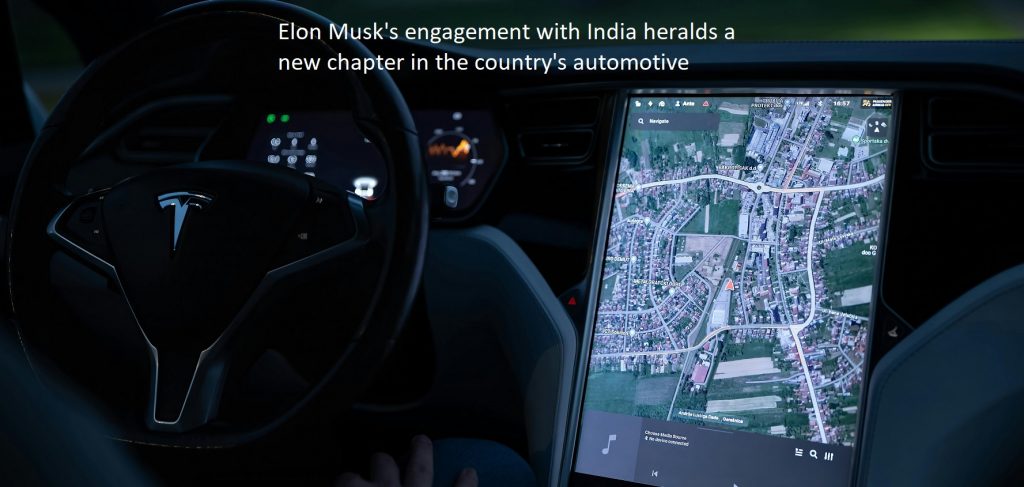Elon Musk’s engagement with India heralds a new chapter in the country’s automotive industry. Tesla’s strategic initiatives, coupled with India’s supportive policies, are set to drive the EV revolution forward, promising a sustainable and technologically advanced future for Indian consumers.
Elon Musk’s arrival in India on April 21, 2024, marks a pivotal moment in the country’s automotive history, signaling Tesla’s ambitious plans to revolutionize the electric vehicle (EV) landscape in one of the world’s largest and most dynamic markets. This visit, long anticipated by industry watchers and EV enthusiasts alike, comes at a crucial juncture as India accelerates its transition towards sustainable transportation.
The Strategic Importance of India’s EV Market
India’s EV market, while still in its early stages, is poised for explosive growth. In 2024, EVs accounted for 7.7% of overall automobile sales, with a total of 2,022,873 units sold, marking a significant 25.4% year-over-year increase from 2023. This growth trajectory aligns with the government’s ambitious target of having 30% of new car sales be electric by 2030, creating a fertile ground for Tesla’s expansion.
The Indian government’s commitment to fostering EV adoption is evident in its policy initiatives. In October 2024, the PM Electric Drive Revolution in Innovative Vehicle Enhancement (PM E-Drive) scheme was launched, offering substantial subsidies and demand incentives totaling Rs 3,679 crore to accelerate EV adoption across various vehicle categories. This scheme, replacing previous initiatives like FAME and EMPS, demonstrates India’s resolute push towards electrification.
Tesla’s Strategic Moves and Challenges
Tesla’s approach to entering the Indian market has been methodical and multifaceted:
Showroom Initiatives: The company has strategically selected locations for showrooms in New Delhi and Mumbai, two of India’s largest metropolises. In New Delhi, Tesla has identified a space in the Aerocity area near the international airport, while in Mumbai, a location in the prestigious Bandra Kurla Complex has been chosen. These showrooms, each spanning approximately 5,000 square feet, are set to become the face of Tesla in India.
Talent Acquisition: Tesla has launched a significant recruitment drive, posting at least 13 job openings across various roles including service technicians, customer engagement managers, and store managers in Mumbai and Delhi. This move underscores Tesla’s commitment to building a strong local team to support its operations.
Manufacturing Plans: Elon Musk is expected to unveil investment plans ranging from $2-3 billion during his visit, primarily aimed at establishing a new manufacturing facility in India. This aligns with the Indian government’s “Make in India” initiative and could significantly boost local job creation and supply chain integration.
Potential Collaborations: Reports suggest that Tesla is considering a joint venture with Reliance, India’s largest conglomerate, to build a manufacturing facility and develop EV infrastructure in the country. Such a partnership could provide Tesla with valuable local insights and resources.
However, Tesla’s entry into India is not without challenges. Historically, high import duties have been a significant barrier, with CBU vehicles priced above $40,000 facing a 100% duty. The Indian government’s new EV policy, announced in March 2024, offers some relief by reducing import duties to 15% for automakers investing at least $500 million in local manufacturing. This policy change could make Tesla’s vehicles more affordable and competitive in the Indian market.
The Competitive Landscape
Tesla’s entry is set to disrupt the Indian EV market, which is currently dominated by domestic players. In 2024, high-speed e-2Ws led the market with sales of 1,211,193 units, followed by e-rickshaws (481,599 units) and electric 4Ws (105,695 units). Tesla’s introduction of its cutting-edge EV technology and brand appeal could significantly alter consumer preferences and accelerate EV adoption across segments.
The Road Ahead
Elon Musk’s visit to India, culminating in a meeting with Prime Minister Narendra Modi on April 22, 2024, is more than just a business expansion move. It represents a convergence of technological innovation, sustainable development, and economic growth. As Tesla integrates into India’s automotive landscape, it is poised to:
- Accelerate India’s transition to sustainable energy
- Inspire technological advancements in the domestic automotive industry
- Redefine consumer experiences in the EV sector
- Create new job opportunities and skill development in advanced manufacturing
The success of Tesla’s venture in India could serve as a catalyst for further foreign investment in the country’s EV sector, potentially transforming India into a global hub for EV manufacturing and innovation.
As Elon Musk and Tesla embark on this ambitious journey in India, the eyes of the global automotive industry are firmly fixed on this developing story. The coming months and years will reveal the true impact of this pivotal moment in India’s automotive history, potentially reshaping the future of transportation not just in India, but across the developing world.
#ElonMuskInIndia #TeslaIndia #ElectricVehicles #SustainableMobility


